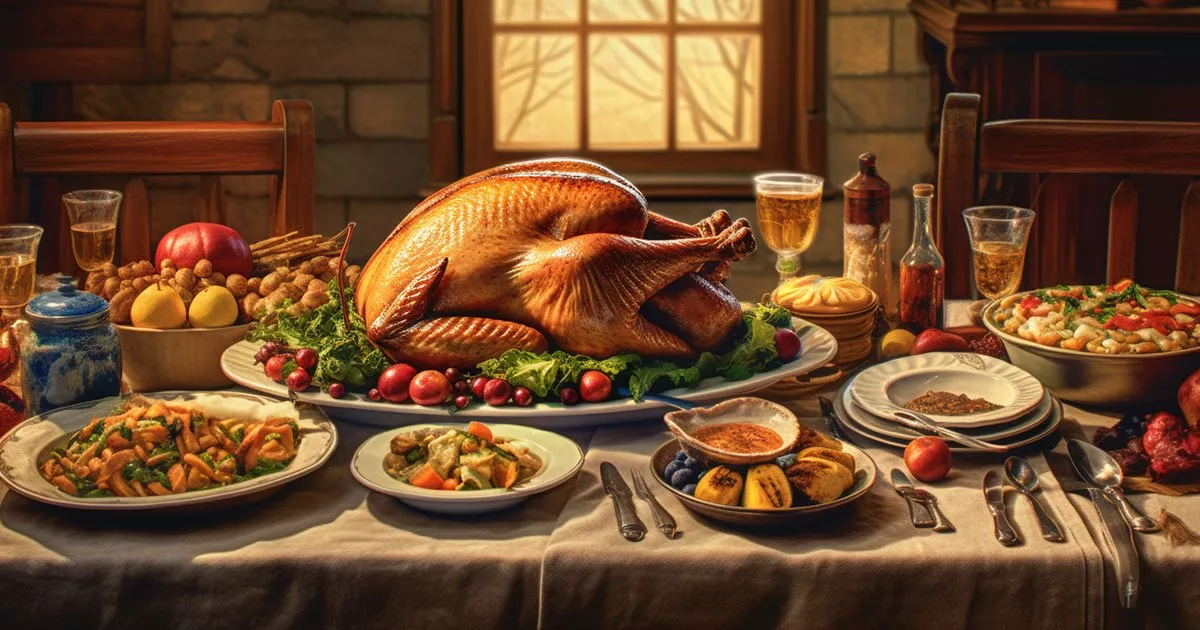

Thanksgiving Day is a special moment to express gratitude for our loved ones – our friends and family. It’s an opportunity to pause and appreciate all the good things in our lives. Our health, wealth, and relationships contribute significantly to our contentment and overall well-being. However, each year as we strive to relish this holiday, we often encounter those who dwell on the darker aspects of the first Thanksgiving. Instead, let’s explore the history of Thanksgiving from a more uplifting perspective.

The fall harvest season has been celebrated by humans worldwide, probably since farming became widespread over the millennia. Once the harvest came in and was bountiful, it meant food stability for the long, harsh winters. A celebration would have been in order before supermarkets existed, where you had food available year-round.
Modern-day celebrations are more of a tradition of the harvest season as we transition into the colder months. Thanksgiving in America today dates back to 1619, when 38 English settlers landed in modern-day Virginia. Once they arrived, they declared a celebration. Other popular origins are of the feast had between the Puritans and Wampanoag in 1621 and 1623 in Massachusetts. Religious leaders often called for days of fasting or feasting during this time based on current events. There were no set days. And they were usually multi-day events held after a war victory or after droughts ended.
This was the case up until around 1682, during the revolutionary period. Powers began shifting from the church to the states. Political leaders would call for harvest feasts based on events favorable to their cause.
Check out these Nursery Rhyme Origins
George Washington declared the first national Thanksgiving Day on November 26th, 1789, as a day of thanks and public prayer. This was seen as a way of uniting the young country. But Thanksgiving was mainly left up to the states until 1863, when Abraham Lincoln declared it a federal holiday. Every president after that said it was a holiday year after year until 1942, when Franklin D. Roosevelt announced every 4th Thursday in November to be Thanksgiving.
There has been much debate over the first actual celebrations of Thanksgiving. Also, whether or not it should be a holiday or a religious celebration. Historic leaders in Massachusetts and Virginia both argue the first Thanksgiving was held in their area. This led John F. Kennedy to acknowledge both accounts in a proclamation on November 5th, 1963, stating:
“Over three centuries ago, our forefathers in Virginia and Massachusetts, far from home in a lonely wilderness, set aside a time of thanksgiving. On the appointed day, they gave reverent thanks for their safety, for the health of their children, for the fertility of their fields, for the love which bound them together, and for the faith which united them with their God.”John F. Kennedy

During harvest celebrations in England, the goose was the go-to meal. However, geese were more challenging to obtain in the new world. Wild turkeys and ducks were more abundant when the settlers first came to America. Once immigrants settled into the new world, turkey was always available on the farm. Pigs were always on the menu, so ham was a staple.
Thanksgiving traditions have evolved over the years, with each generation adding its unique touch. Today, it’s not just about the feast but also about spending quality time with family, watching parades and football games, and giving back to the community.
Many families have their unique traditions, from specific dishes to games and activities that bring everyone together. The essence of Thanksgiving remains the same – a time to give thanks and celebrate the abundance in our lives.
Thanksgiving Day is more than just a historical event; it’s a cherished tradition that brings people together. By focusing on the positive aspects and the spirit of gratitude, we can appreciate this holiday even more. Whether you're enjoying a turkey or ham, celebrating with family, or reflecting on the history, Thanksgiving is a reminder of the importance of gratitude and community.
Odd History Fact: During the 1821 feast in Plymouth, the Wampanoag brought five deer, and the settlers supplied waterfowl. So there was likely no turkey at what many consider the first Thanksgiving.